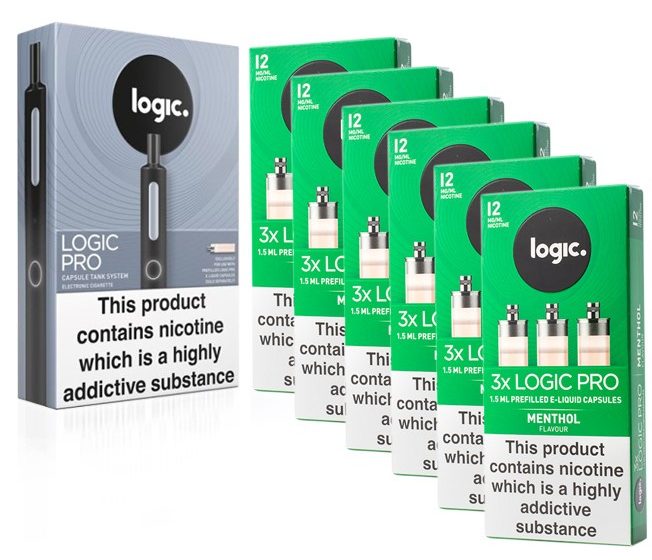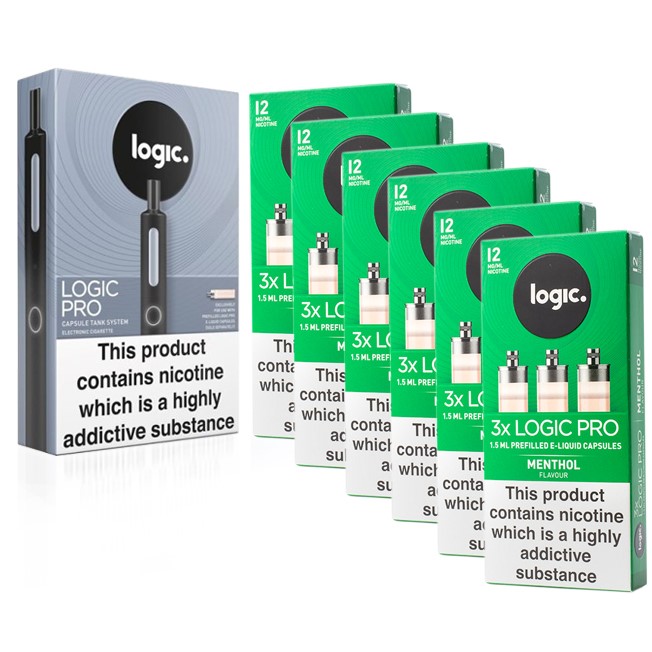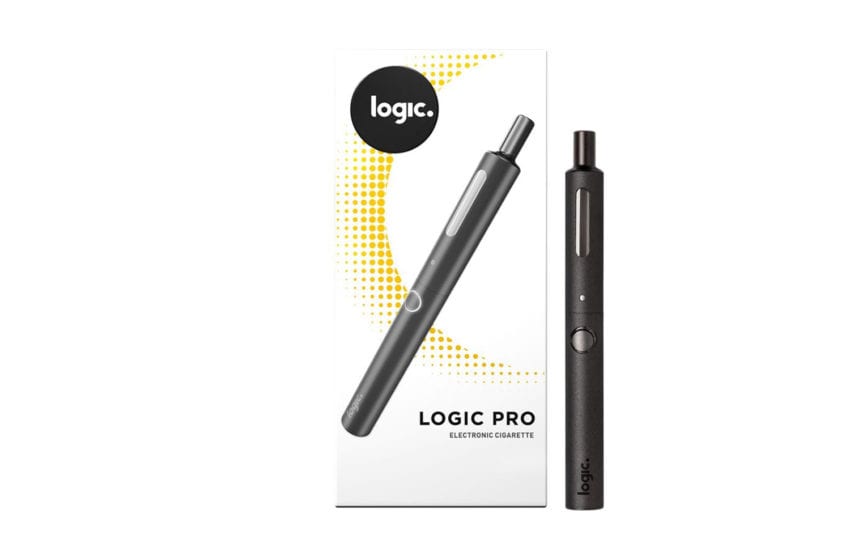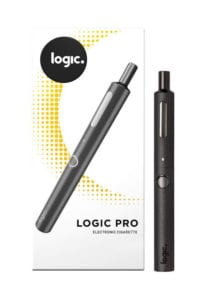
What the recent marketing denial order for Logic’s menthol vapes implies for flavored e-cigarettes
By Stefanie Rossel
On Oct. 26, the U.S. Food and Drug Administration wrote a new chapter in the story of electronic nicotine-delivery systems (ENDS) regulation. That day, the agency for the first time rejected a premarket tobacco product application (PMTA) for a menthol e-cigarette. Logic Technology Development received marketing denial orders (MDOs) for its Logic Power Menthol E-Liquid Package and its Logic Pro Menthol E-Liquid Package.
In a press release accompanying its decision, the FDA said the rejection was based on a full scientific review. The applications, the FDA argued, “lacked sufficient evidence to demonstrate that permitting the marketing of the products would be appropriate for the protection of the public health.” The evidence provided within the application, it said, did not demonstrate that these menthol-flavored e-cigarettes were more effective in promoting complete switching or significant cigarette use reduction relative to tobacco-flavored e-cigarettes among adult smokers.
In its statement, the agency also referred to the 2022 National Youth Tobacco Survey (NYTS), which had been released shortly before the Logic MDO. “For nontobacco-flavored e-cigarettes, including menthol-flavored e-cigarettes, existing evidence demonstrates a known and substantial risk with regard to youth appeal, uptake and use,” the FDA wrote.
Tobacco harm reduction advocates were dismayed. The MDO shattered their hopes that mentholated vapor products would be allowed to remain on the market as a less risky alternative to mentholated cigarettes, which the FDA wants to prohibit. They were also surprised given that the FDA in late 2021 authorized 22nd Century Group to market its reduced-nicotine VLN Menthol King brand as a modified-risk tobacco product.
According to data by the Centers for Disease Control and Prevention, menthol-flavored products accounted for 37 percent of all cigarette sales in the U.S. in 2019 and 2020.
Misplaced Priorities
Critics also lambasted the agency’s focus on the risk of youth uptake at the expense of the opportunity to move adult smokers to lower risk products. Christopher Russell, director at Russell Burnett Research and Consultancy, made up a quick calculation based on recent NYTS data. Of the 2.55 million U.S. students who had used an e-cigarette in the past 30 days according to the survey, 84.9 percent had used flavored vapes. Of the current flavor vapers, 26.6 percent consumed menthol ENDS, which corresponded to 2.12 percent of U.S. youth having vaped menthol in the past 30 days. “MDOs for menthol e-cigarettes,” he concluded, “equals banning menthol to 100 percent of adults in order to protect under 3 percent of youth.”
Neil McKeganey, co-director of the Centre for Substance Use Research, went a step further, quoting a Scottish study carried out by his institution that looked at ENDS use among representative samples of U.S. youth and adults in 2021 and 2022. Out of the 1,215 youth aged 13 to 17 surveyed in 2022, he said, 0.2 percent had ever used a Logic Power and 0.5 percent had ever used a Logic Pro.
When the Scottish researchers looked at youth e-cigarette use over the last 30 days, the levels of Logic use shrank to 0.1 percent of youth reporting having used the Logic Power during that period whereas the level of Logic Pro use was so low that it was not even recorded.
“In dispatching the MDOs for these two products,” he stated, “the FDA seems to have set aside a commitment to review the data around individual devices and liquids and to formulate a response in terms of the brand of products being used and justify the denial orders issued by reference to the NYTS data.”
Jim McDonald of Vaping360 predicted a rise in illicit trade if the FDA blocks the legal path to market for menthol vape products. The FDA, he said, ignored the fact that most youth vapers use unauthorized gray market flavored disposable vapes, many of which are menthol flavored. “They will continue using these products, too, while the FDA pursues its goal of eliminating legal vaping, locked into the belief that its ‘authority’ has some effect on the market,” wrote McDonald.
In March, the FDA authorized Logic devices with tobacco-flavored refills. To date, the agency has not approved a single vapor product with nontobacco flavors.
Shortly after receiving its MDO, Logic Technology Development secured a stay of the FDA order in court, allowing retailers and wholesalers to continue selling Logic menthol products for the duration of the stay. Even if the court requires the FDA to reevaluate the evidence, this does not guarantee a more favorable outcome for Logic and the future of menthol vape in the United States.
Understanding the FDA’s Requirements
Despite Logic Technology Development’s travails, Nveed Chaudhary, chief scientific and regulatory officer at Broughton Group, is confident the recent MDOs do not mark the beginning of the end for menthol and other nontobacco-flavored e-liquids in the U.S.
While he agrees with McKeganey that the FDA’s positions are being driven in large part by the data from cross-sectional studies like the NYTS, Chaudhary believes the fundamental issue is how the PMTA studies were designed, how the data has been interpreted and how the arguments have been presented to the FDA. “Based on the original PMTA guidance and then the Final Rule, many, if not all, of the applications for menthol and nontobacco-flavored products were considered to be ‘equal,’” he says. According to Chaudhary, the relative benefits of all the ENDS flavors together were compared with the risks of smoking combustible cigarettes. The youth access measures introduced were the same across all flavors of a given platform.
“What has become very clear from the FDA’s recent communications, especially through the MDOs, is that they do not consider all flavors of ENDS to have the same risk profile—in this case, the risk of promoting on-ramping amongst youth,” says Chaudhary.
“Therefore, the expectation from the FDA has evolved. Given the data from studies such as NYTS, the FDA are now saying that the PMTA applications need to demonstrate that there is additional benefit of the menthol over tobacco flavors for current smokers—essentially that the additional benefit outweighs the continued risk of youth finding menthol more attractive. Over time, as the industry presents this data to FDA and FDA begin to approve menthol-flavored products, I can imagine a situation where the same would apply to other nontobacco and nonmenthol flavors—only that, for these flavors, an additional benefit for smokers compared with menthol that outweighs the risk on youth use would be required.”
Remediating Deficiencies
Chaudhary believes that “with the addition of a few relatively inexpensive studies and an overhaul of the dossier to build the arguments that FDA want to see,” Logic Technology Development should be able to convince the agency of the additional benefits of nontobacco flavors.
Attempts at rectification, however, may prove futile. In January 2020, the FDA banned all flavors except tobacco and menthol in cartridge-based e-cigarettes. In September 2020, the agency signaled that it would not authorize flavored products without extraordinary evidence. With Logic Technologies Development being part of Japan Tobacco International, one of the world’s leading players, it may furthermore be assumed that the company submitted a very comprehensive application.
While acknowledging that many of the applicants are large multinationals with the financial power to conduct large complex studies, Chaudhary says this does not mean that the studies that the FDA is now looking for were in fact conducted. “It all goes back to the industry’s understanding of the PMTA guidance and final rule back in September 2020 and the way in which the FDA have chosen to enforce the rule today,” he says. “The ongoing view of FDA is that that NYTS illustrates a preference for menthol flavors amongst youth. Therefore, since the original studies were designed to compare all flavors of ENDS to combustible cigarettes; they are not geared to demonstrate additional benefit of menthol flavors compared with tobacco flavors. I would say for any new applications, that has to be a central question to which the application must provide answers.”
Chaudhary deems it likely that much of the data required to build these arguments already exists in the comprehensive PMTA applications—perhaps with some gaps that could be potentially filled with relatively inexpensive studies. He expects the FDA to apply the same logic to flavored disposable products, which are exempt from the agency’s 2020 flavor ban and have recently experienced a surge in sales. “I would imagine that unless any company has constructed their PMTAs to show the additional benefit of flavors compared to menthol and menthol compared with tobacco flavor, they will also receive MDOs,” says Chaudhary.
“I think we all agree that this is awful news for U.S. smokers who will be denied the wide range of options that they need to stop smoking,” he continues. “It seems that the only way to re-offer smokers these critical choices is to ensure that we as an industry are responsible. We must ensure that we understand the evidence the FDA want to receive and provide this data to them so that menthol and ultimately other flavors can be authorized back into the marketplace, and all smokers can continue their off-ramping journeys.”
Chaudhary says the industry needs to move forward, put aside grievances that have arisen as a result of how the FDA has enforced the PMTA final rule and provide the agency with the data it wants to see to ensure that smokers can have these products in their hands at the earliest opportunity.
“Any integrated technology that can minimize or even eliminate underage use of e-cigarettes would lower the risk of youth use and therefore lower the bar for the additional benefit data that the FDA are now asking for,” he says.






 Logic brand e-cigarettes will end online sales of its products in the U.S. “Unfortunately, as of March 16, 2021, we will discontinue online sales of Logic products,” the manufacturer wrote in an email to customers. “Due to recent
Logic brand e-cigarettes will end online sales of its products in the U.S. “Unfortunately, as of March 16, 2021, we will discontinue online sales of Logic products,” the manufacturer wrote in an email to customers. “Due to recent